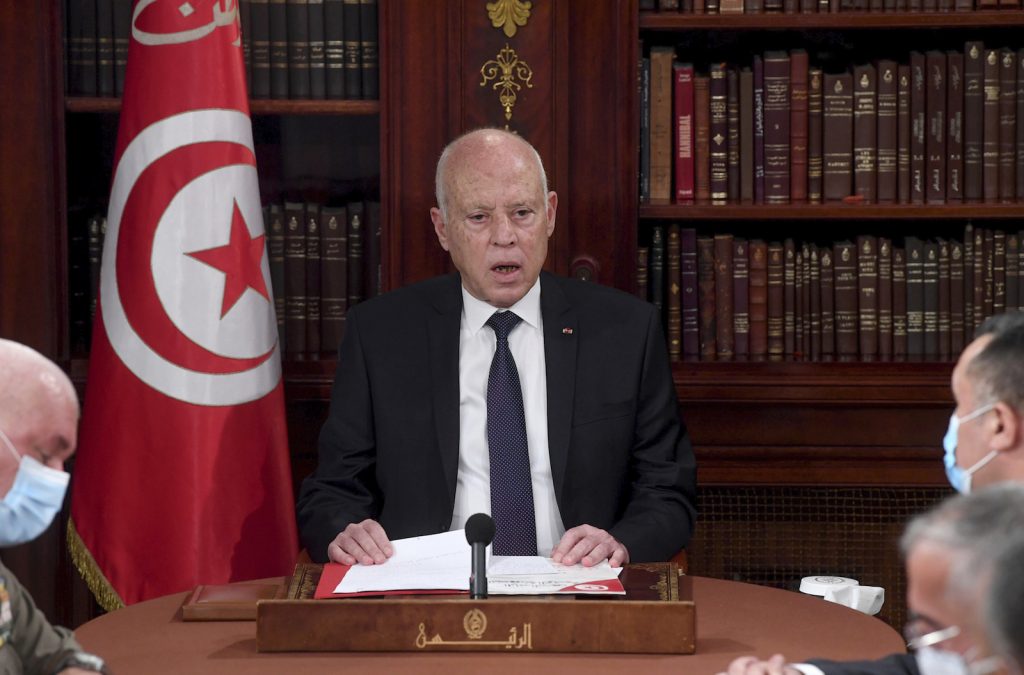On July 25, Tunisia’s Republic Day, Tunisian President Kais Saied suspended the country’s parliament, rescinded the immunity of all parliament members (many of whom have been charged with corruption), and dismissed Prime Minister Hicham Mechichi. Saied had appointed Mechichi to the post of Prime Minister exactly one year earlier on the country’s national holiday.
Surrounded by his National Security Council on Sunday, Saied invoked Article 80 of the Tunisian constitution, which gives him complete control of the state under a national emergency. During a televised address, Saied announced:
First decision: freezing the functions of the parliament; the Constitution does not allow its dissolution but it allows the freezing of its activities… Second decision: the lifting of the parliamentary immunity of all deputies. Third decision: the President of the Republic will take charge of the executive power, with the help of the government, which will be headed by a new leader appointed by the President of the Republic.
On Monday, Saied announced a month-long curfew. There have been reports that Saied has closed the borders, and the Administration of Borders and Foreigners (an agency within the police) took over the airports.
Two months ago, leaked documents revealed plans for a “soft coup” in Tunisia, which would invoke Article 80 of the constitution and place under house arrest high-profile businessmen, advisors at the Prime Minister’s Court under house arrest, and key members of Ennahdha (or “Renaissance Movement Party”), the bourgeois Islamist ruling party that emerged after the 2011 uprisings. Key components of the plan were executed on Sunday, and there have been several high-profile arrest attempts. The deputy of the parliament, Yassine Ayari, stated that French officials were aware of the plans as early as July.
The power grab comes in the midst of intense protests in key cities throughout the country which have grown in intensity over the past few weeks. Protestors denounced economic instability, police brutality, and the persistent Covid-19 crisis, which was exacerbated by the government’s gross mishandling of testing and vaccine distribution. Tunisia’s Health Ministry described the country’s Covid crisis as “catastrophic,” with nearly 20,000 deaths in a country of 12 million people, to whom only around 2.5 million vaccine doses have been administered to date. The country’s unemployed rate has risen to nearly 18%, and its debt has skyrocketed in the past two years, with a rate hovering around 91% of the country’s GDP. This is the result of Tunisian capitalism in crisis, with the most vulnerable of the working class taking the brunt of it.
Throughout the past few weeks, protests across the country have targeted Ennahdha. In the elections that followed the ousting of then-president Zine El Abidine Ben Ali, the masses (particularly the unemployed youth on the streets) placed their social and democratic aspirations in the previously repressed Ennahdha. Yet nearly a decade later, it has become clear to the masses that Ennahdha’s pro-market policies and corruption have worsened structural problems like poverty and unemployment.
On Sunday, protesters in Monastir, El Kef, Sousse, and Sfax stormed or attempted to storm Ennahdha offices, searching for documents revealing government corruption and cronyism. In Touzeur, protestors set fire to the party’s local headquarters. Police used pepper spray against protestors in Tunis who demanded that Prime Minister Mechichi step down. Hundreds of Tunisians celebrated the President’s subsequent announcement, which capitalized upon public outrage against widespread government corruption and incompetence. Ennahdha represents the moderate wing of political Islam linked to the traditionalist bourgeoisie, a political sect that was highly repressed under the Ben Ali regime. Many of these parties advocate for an electoral strategy that combines the ideals of liberal democracy with Islamic law.
Supporters of the right-wing Ennahdha party are furious. Rachid Ghannouchi, Ennahdha leader and Speaker of Parliament, called for supporters to come to Parliament, but they, along with Ghannouchi himself, were blocked by security forces. Saied’s supporters, in many cases, outnumbered those of Ennahdha. Ghannouchi denounced the move and claimed that Saied’s supporters were “closer to anarchist groups,” rejecting the notion that they may be citizens expressing their legitimate frustration with the party. The working class, the youth, and the popular classes, who have developed anti-government sentiment after so many years of corrupt governments and the fallen promises of the Jasmine Revolution, must have no illusions or confidence in Saied, who uses a populist rhetoric to conceal the fact that he is a reactionary and anti-working class figure.
Tunisia’s president and prime minister have been embroiled in a power struggle over the last year, feuding over cabinet seats and control over the security forces, which has derailed the leaders’ efforts to handle the pandemic and address an imminent fiscal crisis. The country is in the process of negotiating the terms of yet another loan from the International Monetary Fund (IMF). These loans, part of a neoliberal and imperialist capitalist program, have promoted trade expansion with Europe, significantly increased the country’s dependence upon European markets, and hurt the working class through austerity measures.
Whether supported by the Tunisian public or not, Saied’s consolidation of power should not be seen as the answer to the country’s woes. Last month, a blogger was arrested and now faces charges in a military court for insulting Saied, adding to the 40 bloggers who have been detained between 2018 and 2020 (Saied took power in September 2019). An anonymous source predicted that the president will propose a referendum for the presidential government to replace the current parliamentary system. Saied is capitalizing upon the delegitimization of the present regime and its parties in the eyes of the popular masses in a Bonapartist attempt to rise above the fray and re-establish “order” in the favor of the ruling class.
On a phone call on Monday, U.S. Secretary of State Antony Blinken feebly “pressed” Saied, belatedly urging him to respect democratic principles after sacking the government. Aside from Turkey, other global powers such as Germany and France have responded with similar caution. The Tunisian working class and oppressed must have no faith in the imperialist and regional powers with their own interests in the political economic “development” of the country, and act in independence from these forces.
Neither Saied, the conservative law-and-order leader threatening free speech and attempting to consolidate power and appease the public by arresting a few “sacrificial lambs” of the elite political class, nor Ennahdha, the right-wing party that has proved to be an ally of the bourgeoisie , should represent the Tunisian people. This is far from the democracy for which the revolutionaries of the Arab Spring ten years ago put their lives and futures on the line.











